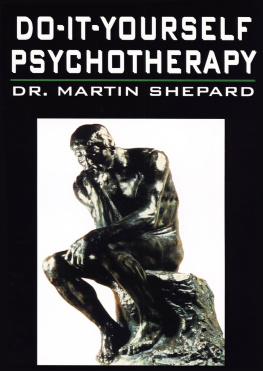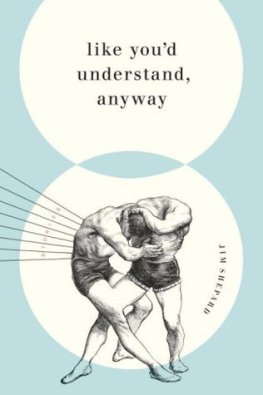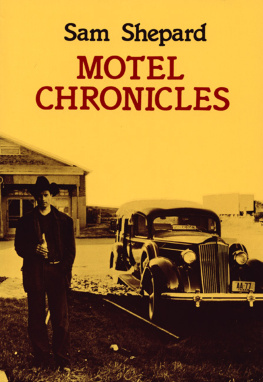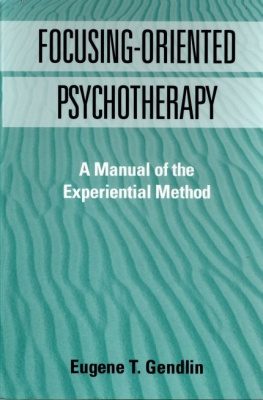Do-It-Yourself Psychotherapy
Dr. Martin Shepard

New York
Contents
To Judy
PREFACE
This book was written both for normal people interested in living an even richer and more fulfilling existence and for those individuals who feel themselves to be neurotic, troubled, adrift, or otherwise unhappy.
For this second group, the Do-It-Yourself approach is presented as a very real alternative to formal psychotherapy. Followed conscientiously, it should enrich the lives of many who attempt it. Yet, just as no single school of psychotherapy can legitimately claim to be a universal cure-all, neither does the Do-It-Yourself system.
Those who do the work outlined in the following pages and find no improvement in their lives can always consider the possibilities of seeing a professional therapist. Such helpin the form of Encounter Groups or formal psychotherapy (and involving the time and costs that they do)seems warranted, to me, only after attempting a self-directed approach.
There is an ancient medical dictum which requires that the simplest therapies be tried before implementing more complex and laborious ones. It is in accordance with that principle that this book is offered.
Case histories illustrate the text throughout, and pseudonyms are used in these examples.
Martin Shepard, MD
1. HONESTY AND COUNTERPHOBIA
It is clear that many of us pass too much of our lives living in a state of conflict, and too little of our time living naturallyliving in accordance with our own natures. The reasons for this are equally clear to any student of psychology. We have been raised to feel it is wrong to express various facets of our personality. How wrong we feel it is to express either tenderness, lust, anger, need or independencealone or in combinationdetermines our degree of so-called mental health or mental illness.
When we believe that certain parts of our being are bad, we suffer from failing to satisfy these distrusted needs and impulses. Like the adolescent schoolboy who is reluctant to approach the girl he cares about for fear she will find his desire for her offensive, we may remain distant, secret and lonely admirers. Or we suffer from crippling symptoms designed to mask our bad impulses. We can develop tics to disguise our anger, ulcers to hide our competitiveness, phobias to stifle our urges for independence. And when these normal impulses do break outdespite our very best efforts to control themthey break out with a power and a force a hundred times greater than usual. It is like water bursting from behind a dam. It will have a catastrophic effect on the valley below. Yet it isnt the water itself that is responsible. Rather, it is the damming-up process that invites the holocaust.

For some 30 years now, people living in Western civilizations have turned to psychotherapists when they wished to abandon their self-conflicts and live in greater self-harmony. This process of going from illness to health is termed psychotherapy. It is my contention, after many years of clinical practice, that most troubled individuals can make this transition without spendingor, in many cases, wastingtheir time and money on a therapist. The purpose of this book is to provide you with a psychological road map so that you can arrive at your destination directly, rapidly, and at the lowest possible fare.
All the formal psychotherapiesbe they the various schools of psychoanalysis (Freudian, Adlerian, Kleinian, Jungian, Sullivanian, Rogerian) or the other popular psychotherapies (Gestalt, Transactional Analysis, Psychodrama, Rational-Emotive Therapy, Group Therapy or Encounter Groups)share two themes. One element common to all these systems is that one person (the patient) tells another person (the therapist) or a group of people honestly what is on his or her mind. Through this process, shameful material (angry, sexual, or dependent feelings and/or activities, self-indulgences, deceits, etc.) is eventually shared. The therapist (or the group) accepts the patient notwithstanding these bad thoughts, feelings and acts. Through the acceptance of this other human or group of humans, the patient finds self-acceptance.
In addition, to one degree or another, the patient is encouraged to act against his fears and break his repetitive, self-defeating patterns. This is done directly in Encounter Groups, Rational-Emotive Therapy and Psychodrama, and indirectly in the various forms of psychoanalysis, Transactional Analysis and Gestalt Therapy. The indirect approach consists of the supposedly non-directive therapist asking questions (Have you ever thought of ? Why havent you ?) or directing his interest, analysis and attention to areas where the person seems to be on an emotional treadmill. Either way, the patient is encouraged to dare to be himself and be less dependent on the opinions and regard of others.
In effect, then, successful psychotherapy changes a shame-ridden, closed-in person into a shameless and open one. And it does so by the twin processes of asking for honest, open expression of oneself to other people and by requesting one to act counterphobically (against ones fears). These are the twin pillars that this book is based upon.
How do I know I can do it on my own? you may well ask. You dont. But there is no assurance that you will better your condition by seeing a psychotherapist either. Critics of psychotherapy are quick to point to studies that indicate that prospective patients on a psychiatric clinics waiting list do as well, statistically, as those patients seen by the resident therapists. Or the same critics will mock the entire field of psychotherapy by singling out other studies showing that 33 per cent of people who see therapists improve, 33 per cent remain about the same, and 33 per cent show a worsening of symptoms.
Still, any clinician will tell you that those people who do improve are the ones who both dare to be open and honest and dare to act against their fears. It seems, then, that the achievement of a harmonious, self-accepting state depends more on the motivation of the individual patient than it does on the skill of the individual therapist. So your chances of improving on a Do-It-Yourself approach depend largely (as they would if you were to see a therapist) on what you put into it. Besides which, you are not really doing-it-on-your-own, for in this approach you will still have to share your thoughts, desires and actions with other people. Except that they will be lay people, and not therapists.
But ordinary people arent properly trained, you may counter. They arent as stable. They may react the wrong way. They may disapprove of what I tell them or offer confusing suggestions. Here, too, all I can tell you is that you are correct. Lay people may do that. But so may therapists, for therapists are human too. They are laymen with a little formal training in the field of psychology. They have feelings, prejudices, values, that they often trywith only varying degrees of successto hide.
Actually there are some distinct advantages in revealing yourself to an ordinary person instead of a therapist. If, for instance, a lay person reacts untherapeutically, you can pick yourself up, dust yourself off and try again. If a therapist reacts the same way, you immediately presume it to be your fault. It hurts more and you are less likely to attempt the same revelations. Similarly, if a therapist reacts with acceptance, you are never sure whether this is because he is being paid by you or was trained to
















